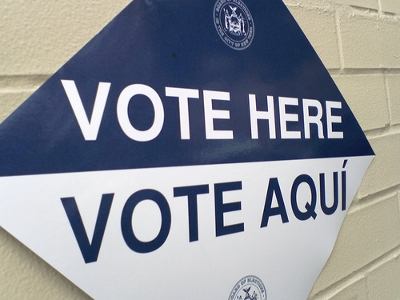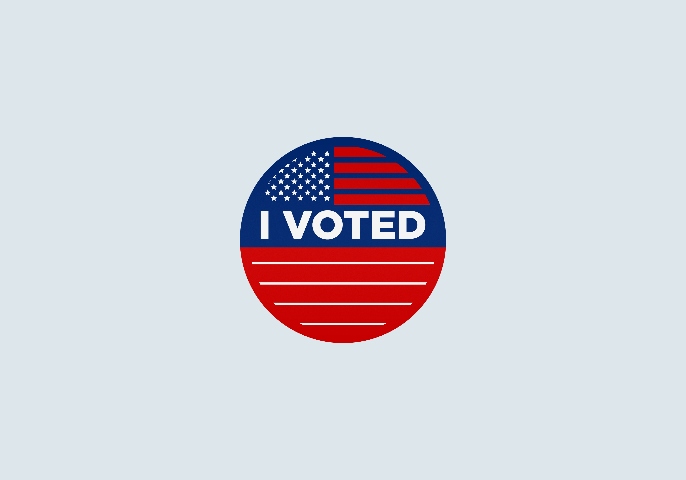 As election turnout levels in the U.S. continue to fall, political leaders and academics have become increasingly interested in what motivates people to actually vote. USApp Editor, Chris Gilson talks to Stefano DellaVigna about his recent research that posits that people vote because they might be asked about whether or not they voted. He finds that in general, voters hate to lie, even when offered a monetary reward to do so, and that there is a distinct ‘cost’ to people when they lie about not voting. Professor DellaVigna recently spoke at the LSE Government Department PSPE Research Seminar, click here for further details.
As election turnout levels in the U.S. continue to fall, political leaders and academics have become increasingly interested in what motivates people to actually vote. USApp Editor, Chris Gilson talks to Stefano DellaVigna about his recent research that posits that people vote because they might be asked about whether or not they voted. He finds that in general, voters hate to lie, even when offered a monetary reward to do so, and that there is a distinct ‘cost’ to people when they lie about not voting. Professor DellaVigna recently spoke at the LSE Government Department PSPE Research Seminar, click here for further details.
1. Most people might assume that people vote in order to influence election outcomes, yet your recent paper “Voting to tell others” has a different take on voter motivation. What is your point of departure, and how is it important?
The idea that people vote to influence elections, also called the ‘pivotal voting model’, runs into problems in elections for Congress and in, general elections, because the probability that any given person will influence an election is really tiny; one runs into difficulty as it’s hard to think that the individual person can really affect elections. So we said that individuals are in a social context: after the election, somebody could come up to them and say “Hey, did you vote yesterday?”, or “For whom did you vote?”, and at that point, a person that actually voted can presumably just say “Yes, I voted”. Someone who did not vote is faced with the choice of two evils – one is saying, truthfully, “I did not vote”, which usually doesn’t go so well, or lying and saying “I voted”. But lying is costly psychologically. We know that there is this trade-off, because, at least in U.S. data nearly half of non-voters retrospectively say that they voted – they lie. Clearly they’re facing this trade-off.

Our model is simple. People expect to be asked whether they voted, and because they expect to be asked, it’s to their advantage to vote, because they put themselves in this situation to get a positive social image, without lying. Whereas if they happened to not vote, then they are faced with a difficult choice; after an election, people report being asked about 5 to 10 times whether they voted. We’ve studied this, and it turns out that we think this is a plausible reason why people vote.
2. Your paper uses quite a novel approach to model voting – could tell our readers a bit more about how it works and why you used it?
Our model is based on the idea of social image utility; that people care what others think of them, e.g.: “I like to tell people that I’m a voter”, “I hate to tell others that I’m a non-voter”, and “I don’t like to lie”. So now, to identify this psychological mechanism – you can imagine that it’s not obvious – we organized a field experiment around it. In 2011, we went door to door asking people about voting, and about whether they voted. Keep in mind that we actually knew whether or not they voted, because the voting record is public (we did this around Chicago). So we picked households we knew did and did note voted in 2010. In some cases, we left a flyer on the doorknob the day before, announcing that we would be doing a survey the next day. In some other cases, we left a flyer that told people that we would be doing a survey the next day, about their voter participation in the 2010 Congressional elections. Then we compared the share of people who were at home, and then did the survey in the two conditions.
So let’s say that voters have pride; they like to tell you that they voted. We’d expect them to be more likely to be at home when they knew that survey was about voting. Let’s say that non-voters have shame and guilt about telling us that they did not vote, so when the flyer informed them that the survey would be about elections, they will sort out [and not be at home]. We found that there is a lot of sorting out by non-voters – you don’t find them at home, and they don’t do the survey, when they know it’s about the election. We didn’t find a lot of evidence that voters sorted in; they seemed to be a bit ambivalent. The context is useful though. This was after the 2010 Congressional elections in the U.S., which was a very bad election season for Democrats (they lost the house by a wide margin), and a good one for Republicans. Looking only at the registered Republicans voters, they sorted in – so they liked to talk about voting. But the Democrats really didn’t want to talk about it. So clearly our results will be context dependent, and we see our method as a first step towards a more generalized use.
3. You found that there is a ‘cost’ to people when they lie about not voting. What is this cost, and how did you determine it?
For a while, economists had what they called “cheap talk” games, and they basically assumed that people will just lie and that’s it – that people don’t mind lying. But luckily, maybe for society, that’s not the case. The evidence definitely suggests that people hate to not tell the truth, even when it benefits them to lie. Some people will lie, but a lot of people really dislike that. So the way we modeled it was that people pay a psychological disutility from not telling the truth, even to somebody that they’ve never met before, and will never meet again. You look them in the eyes, and they just aren’t comfortable not telling them the truth.
To determine this disutility, we took voters that agreed to be interviewed, and asked half of them “Did you vote in the 2010 Congressional elections?” To the other half, we said “Thank you for agreeing to a ten minute survey, we are about to ask you if you voted in the 2010 Congressional election.” We offered both groups a monetary reward for the survey. If respondents said that they did not vote, the survey was eight minutes shorter – only two minutes long – and respondents would be paid the same. In that case, we only asked them, “Did you vote in the 2010 Congressional election?” This was true, so the survey was shorter, so everything we said was truthful – there was no deception. We wanted to see if people would take this time saving.
It turns out that voters hate to lie; the share that said that they did not vote barely moved. This same incentive, however, was effective in getting non-voters to tell the truth. Normally in our sample, about half of the non-voters lied and said they voted, and with this incentive, only 35 percent lied. This is the kind of treatment that we can use to get a handle on the lying ‘cost’, which on average we estimate to be around five dollars. So on average, people dislike telling lies, which is a good thing for society.
4. Why do you think people feel shame or guilt when they admit to others that they haven’t voted?
This probably goes back to maybe evolutionary reasons; individually, we mostly benefit from being selfish, but societally it’s really important to instead have provide public goods – that’s people that who rules, even when no-one’s going to catch them, they’re not going to park in the wrong place, for example, and so I think we have this societal/social pressure for norms to be enforced. Somehow it is critical that we care about what others think about what we do. We’re not able to tell where this comes from, but we can look at the data, and say, “Hey this looks like a really important thing”, where people attach a sizeable social image utility, and there are a lot of settings where this matters: charitable giving is a setting that we’ve cited. People feel really bad turning down a charitable donation in front of a person, but if they can avoid the person that’s asking, they’ll do it. So social norms work in a funny way – if we’re asked to the face, we will not say no. I think that we’re starting to discover that social interactions, and the subtle ways that they work, are really critical.
5. In light of your findings (and with declining turnout in mind) how do you think we can encourage those who are usually reluctant to vote?
Letting people know that others might ask them, is an obvious implication of our study, and it turns out that the Obama campaign did just that, too, as part of their turnout experiments. They let Democratic voters know that they would be asked whether they voted, and so this tight-knit community where there is some informal monitoring does seem to be one of the ways that keeps up voting. Now you may ask, “Is this a good or a bad thing, potentially inflicting shame and guilt on those that don’t vote?”, and that’s part of what we point to. That’s part of how we get voting to be high enough, which is generally a desirable objective.
6. Going back to your point about ‘informal monitoring’ – could you go into a bit more detail about how it works, and if it is consistent across the US?
The two numbers that we have from our survey, is that people report being asked around five times whether they voted, on average, after Congressional elections, and ten times after a Presidential election – that goes the way that you’d expect – the more important the election, the more people inquire about it. There is heterogeneity, some people say it is twenty times, a third of people say zero times. There is some survey evidence that comes up with similar numbers at a national level in the US, but I expect different cultures could be very different. I’m sure in some countries it is not appropriate to ask somebody, and in some neighborhoods. That might be related to differences in turnout, I think that would be interesting to explore.
On 26 November, Stefano DellaVigna spoke at the LSE Government Department PSPE Research Seminar about his recent paper, “Voting to Tell Others”. Click here for full details of the PSPE Research Seminar program.
Please read our comments policy before commenting.
Note: This article gives the views of the authors, and not the position of USApp– American Politics and Policy, nor of the London School of Economics.
Shortened URL for this post: http://bit.ly/18ltGti
_________________________________
 Stefano DellaVigna – University of California, Berkeley
Stefano DellaVigna – University of California, Berkeley
Stefano DellaVigna was educated at Harvard University, where he received his PhD in 2002, the same year he joined UC Berkeley as an assistant professor. He was promoted to Associate Professor in 2008. He is a recipient of an Alfred P. Sloan Research Fellowship for the years 2008-2010 and has been Principal Investigator for an NSF grant.Professor DellaVigna is a Faculty Research Fellow at the National Bureau of Economic Research. He is a 2008 recipient of UC Berkeley’s Campus-Wide Distinguished Teaching Award, as well as a 2004 Social Sciences Undergraduate Research Mentoring Award.







1 Comments